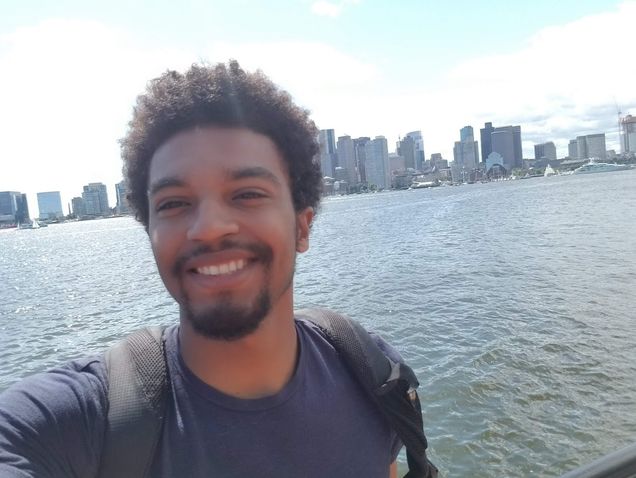By Abby Van Selous (COM’24)
 Hayden Dickerson was in second grade when he first picked up the marine conservation book Reef off his granddad’s coffee table, and his passion for marine science was born. Every time Dickerson (CAS’24) visited his grandfather—which was nearly every month at that age—he would revisit the book.
Hayden Dickerson was in second grade when he first picked up the marine conservation book Reef off his granddad’s coffee table, and his passion for marine science was born. Every time Dickerson (CAS’24) visited his grandfather—which was nearly every month at that age—he would revisit the book.
One time, he asked his granddad if he could have the book and take it home, but his granddad said no.
“It was the end of that,” Dickerson said.
But just a few months later, Dickerson’s granddad gave him a copy of Reef for Christmas, which guided his interest toward marine science.
“I always had an answer for if someone asked, ‘What do you want to be when you grow up?’” Dickerson said. “I want to be a marine biologist.”
When it came time to apply to colleges, Dickerson wrote his college essay about Reef.
Dickerson was originally set to graduate in 2021 with a degree in marine science, but after taking the COVID-19 pandemic particularly hard, he chose to take a leave of absence. He was out of school for five semesters, returning only when he found it possible to complete the re-enrollment paperwork.
Dickerson chose to attend Boston University for the Boston University Marine Science Program (BUMP), which provides students with hands-on laboratory and field experience during the Marine Semester.
Dickerson traveled to Belize twice as part of the BUMP Marine Semester. He also traveled to Indonesia with the Department of Earth & Environment, which increased his interest in physical science.
When Dickerson was in Belize he studied spiny lobsters and, as part of his research, looked at how they interacted with fake spiny lobsters. He wanted to study these interactions to hopefully find a more sustainable mode of fishing. As a part of his experiment, Dickerson placed a spiny lobster in a tank with a fake lobster to see how it would respond to its presence and found that the spiny lobster had no reactions.
“It never threatened it,” he said.
Changing Course
Assistant Professor of Biology Sarah Davies has been both Dickerson’s advisor during his time at BU and his greatest advocate.
Dickerson worked on two research papers in Davies’ lab about the mating habits of corals and coral bleaching. He looked at how coral responds to heat stress and presented this research at a conference. Davies also encouraged Dickerson to go to Belize a second time to continue looking at spiny lobsters.
Dickerson used to have a 10-year plan for his future – he would go to college and study marine science, he would conduct research, and he would become a professor so he could conduct research in his own areas of interest – but after his research experiences and his time away from school, he realized he would rather be an elementary school teacher.
“I’d like to settle down in a higher needs area to help teach there,” he said.
And when Dickerson told Davies that he didn’t want to continue with marine science or academia after graduating she was in full support.
“I didn’t see anything else but a smile on her face and joy in her voice that I wanted to do something that’s really important,” Dickerson said.
Davies then asked him to be a part of an outreach program she was designing that would teach children about coral and coral conservation. The target audience of this program was elementary schoolers – the exact age group Dickerson wanted to teach.
“She incorporated something that was my new passion with something that I was really passionate about in the past,” Dickerson said. “That was really cool.”
Dickerson thinks it’s more important to teach children than to teach mature adults, which partially fueled the shift from wanting to be a professor to wanting to teach elementary schoolers.
Dickerson realized he was good with children after teaching children how to skate at local rinks.
Helping English Language Learners
In January 2023, Dickerson was re-enrolled and moved to Allston. From February through July he worked as a bartender at Troquet in the South End. He found himself with a lot of free time that he wanted to spend in a meaningful way. He walked around Allston looking for things to do and found the Allston Brighton Community Development Corporation, which leads community initiatives such as creating and preserving affordable homes.
When he entered the building, he learned about an opportunity to teach English as a second language, which he chose to pursue.
“You don’t need to know a foreign language, and it’s a low commitment,” Dickerson said. “That was my first real teaching experience to other adults.”
Dickerson works in the service industry, and at almost every job he’s worked there has been someone more qualified than the job they were working but because they didn’t speak English they didn’t get paid as much, he said.
“They’re a busser or a dishwasher or a back server,” he said. “And it’s like, dude, like this is ridiculous.”
Dickerson is currently teaching English to a Romanian woman who recently moved to the United States after retiring.
“It’s been really rewarding,” he said.
After he graduates, Dickerson will continue teaching English as a second language. In a few years he wants to return to school to pursue his teaching degree and eventually one day return to marine science.